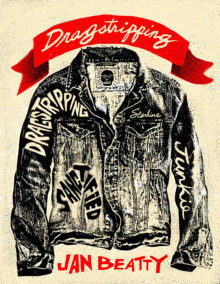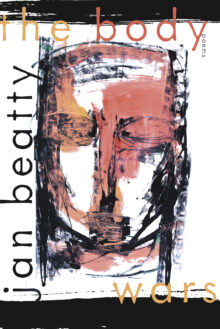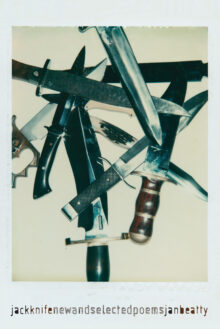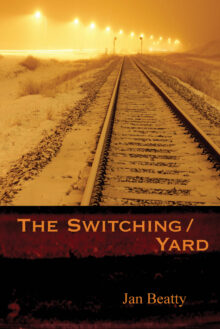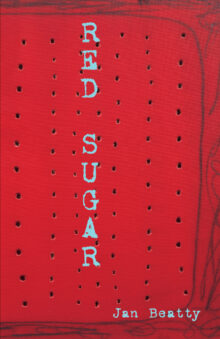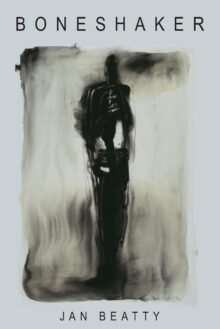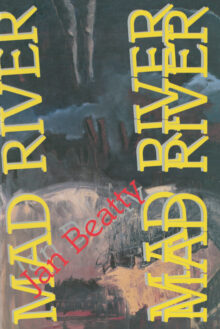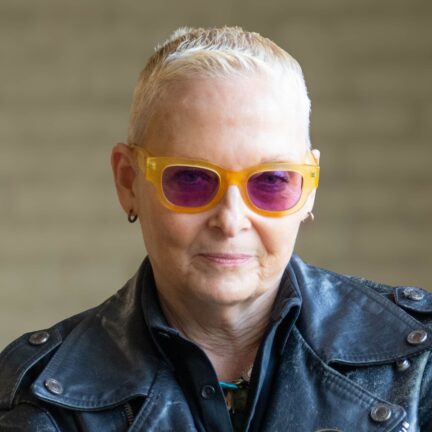
Jan Beatty
Jan Beatty is the author of six previous collections of poetry, most recently The Body Wars and Jackknife: New and Selected Poems, which won the Paterson Poetry Prize. Her memoir, American Bastard, won the Red Hen Nonfiction Prize. Beatty has worked as a waitress, in abortion clinics, and in maximum-security prisons and is professor emerita at Carlow University, where she directed the MFA and creative writing programs and the Madwomen in the Attic writing workshops.
Dragstripping
Poems
Dragstripping, Jan Beatty’s seventh collection of poems, takes readers to the literal dragstrip, the metaphorical dragstrip of the body, and the strip club, where the ecstatic is rescripted and where women disappear and reappear in the crosscut of gender. Transgressing into and out of poetic form, Beatty writes the fractured landscape of the unknown woman, breaking rules of grammar and subverting expected speech, mixing the real and unreal, and finding elation in a strange and shifting land.
The Body Wars
Poems
What would it take to be home in one’s body, to walk around the world as oneself, knowing the pain within and without us? Jan Beatty boldly answers that question by making a fire map of the body. These roiling poems smack into walls of meditation, only to slide down the smooth concrete into the flatline of joy. These are vital poems of dimension, of both psychic and literal travel, of the elasticity of truth and struggle, of the daily nature of desire that brings us to our knees—then shotguns us back to the heart’s center.
Jackknife
New and Selected Poems
In Jackknife: New and Selected Poems, Beatty travels the turns and collisions of over twenty years of work. She moves from first-person narratives to poems that straddle the page in fragments, to lines that sprawl with long lines of train tracks. Always landing in meaning, we are inside the body—not in a confessional voice, not autobiography—but arriving through the expanded, exploded image of many stories and genders. The new poems leap imagistically from the known world to the purely imagined, as in the voice in “Abortion with Gun Barrel”: “I am the counselor,/there are cracks in the barrel of the gun/there is aiming/shots of sorrow—/ shots of light.” Commitment to a rabid feminist voice continues, but arrival has a new ring to it, with beginnings rescripted: “I am a bastard./I walk around in this body of mine.” Beatty’s fascination with the highway and the breakout West jackknifes at the crossroads of the brutal and the white plains of loss—the body torn down and resurrected in the twenty first century.
The Switching/Yard
In Jan Beatty’s fourth collection, The Switching/Yard, she takes us through the ravaged landscape of the American West. In unflinching lines of burning lyric and relentless narrative, she forges the constructed body into movement. What is still stereotyped as the romantic journey—now becomes as scarred as the Rust Belt. What lives in our collective unconscious as the Golden West becomes almost surreal, as these poems snap that vision in half with extended description of ghost explorers.
We see the open truck cab, the farm workers on the corner waiting for pick-up; we see the speaker returning west to find the long-abandoned story of the birthfather. There is no stable landscape here except the horizontal action of moving through. Landscape becomes story. In this extended tale of the idea of family, we find stand-ins for the father in the form of a hit man, Jim Morrison, and ultimately the unyielding road takes the place of the body. The Switching/Yard is at once the horizontal world of the birth table where babies are switched, the complex yard of the body where gender routinely shifts and switches, and the actual switching yard of the trains that run the inevitable tracks of this book.
Red Sugar
In her third collection, Beatty travels inside the body to the blood that codes us, moving beyond the language of post-confessionialism into fourth-wave feminism, challenging notions of the “romantic” “and the “brutal” and how they exist within us and between us.
Boneshaker
Hard-hitting, sophisticated, lyrical exploration of the meaning of the body. Questions icons and invokes taboos.
Mad River
Winner of the 1994 Agnes Lynch Starrett Poetry Prize
Winner of the 2000 Creative Achievement Award from the Pittsburgh Cultural Trust
“In every poem, she keeps her fury contained, but omnipresent, so that it resembles a cornered dog’s warning growl, yet she hints of happier possibilities.”—Booklist

